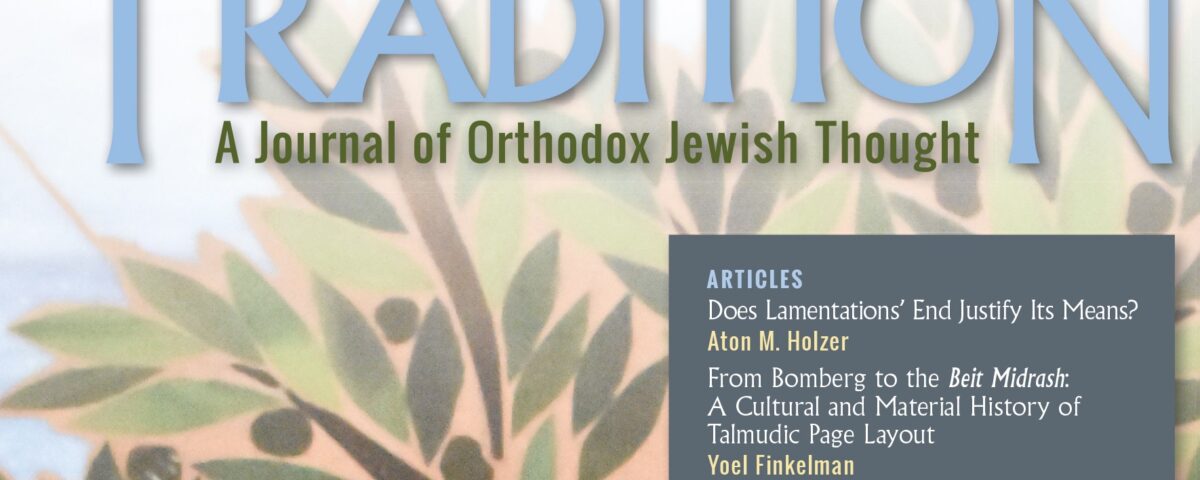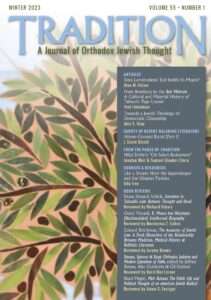TRADITION Winter 2023 Arrives

TRADITION 55:1 (Winter 2023) has begun to arrive in our readers’ mailboxes and is available online with your login for subscribers. What are you waiting for? Get your print or digital access now. This issue of our journal of Orthodox Jewish thought features a number of items sure to dominate conversation this season:
In a richly illustrated essay, Yoel Finkelman takes us on a tour “From Bomberg to the Beit Midrash: A Cultural and Material History of Talmudic Page Layout” [open access]. Lifetime learners take the odd Talmudic page layout, or tzurat ha-daf, for granted. But in fact, it has a history, deriving from medieval and renaissance Christian models. It became the iconic form to print the Gemara largely because of how it serves the pedagogical and intellectual needs of traditional Rabbinic learning.
Aton M. Holzer asks “Does Lamentations’ End Justify Its Means?” The last verse in Eikha has posed both a textual and theological problem for commentators since the dawn of Jewish Biblical exegesis. This article presents four approaches in modern scholarly literature, identifies some antecedents in Rabbinic Midrash and Aggada, proposes a rationale for the choice of approach related to changing historical circumstances in late antiquity, and suggests possible traces of the ideologies represented by these approaches in Jewish ritual observances commemorating the Temple’s destruction.
In a provocative and timely essay Alex S. Ozar aspires “Towards a Jewish Theology of Democratic Citizenship,” grounded on an analysis of halakhic texts. The article argues that as Jews we are called toward exemplary liberal-democratic citizenship. Beyond pursuing our own interests, and beyond even pursuing just societal outcomes, we are responsible for strengthening the bonds of democratic community.
R. David Bleich’s “Survey of Recent Halakhic Literature” undertakes a new series considering the complexities of above-ground burial and the Jewish tradition.
For close to two decades, the Polish-Jewish journalist, religious intellectual, and martyr Hillel Zeitlin sought in vain to establish fraternal societies for the spiritual and ethical revival of the Jewish people. “On Select Redeemers,” Zeitlin’s final manifesto from June 1939—presented here by Jonatan Meir and Samuel Glauber-Zimra in “From the Pages of TRADITION” for the first time in English translation—is a stirring testimony to his resolute faith in the power of individual prayer to affect history [open access].
In “Sources & Resources” Gila Fine asks why every culture, from ancient myth to medieval folktale to modern science fiction, has a story of a hero who sleeps for years and wakes up to a utopian world? How does the Talmud rewrite this legend as a subversion of the normal template in order to share a rabbinic view of redemption. “Honi the Supersleeper and the Utopian Fantasy” explores the Aggada of Honi the Circle-Drawer through the Mishna and Talmud, Epimenides and the Seven Sleepers, King Arthur and Frederick Barbarossa, Rip Van Winkle, and William Guest.
In a particularly rich set of book reviews we feature five of this season’s most talked-about books covering the wide range of our journal’s interest in Jewish thought, law, and history: Richard Hidary on Shana Strauch Schick’s Intention in Talmudic Law: Between Thought and Deed (Brill); Oded Yisraeli’s Hebrew intellectual biography of Ramban (Magnes) is surveyed by Mordechai Z. Cohen; the much-discussed essay anthology on faith-based inquiries, Strauss, Spinoza & Sinai: Orthodox Judaism and Modern Questions of Faith (Kodesh Press) is reviewed by Berel Dov Lerner; Edward Reichman’s halakhic-historical-medical 600-page omnibus, The Anatomy of Jewish Law: A Fresh Dissection of the Relationship Between Medicine, Medical History & Rabbinic Literature (Maggid Books, OU Press & YU Press) is explored by Jeremy Brown; and Adam S. Ferziger turns his critical eye on Shaul Magid’s Meir Kahane: The Public Life and Political Thought of an American Jewish Radical (Princeton University Press), suddenly even more timely following the establishment of Israel’s new government.


